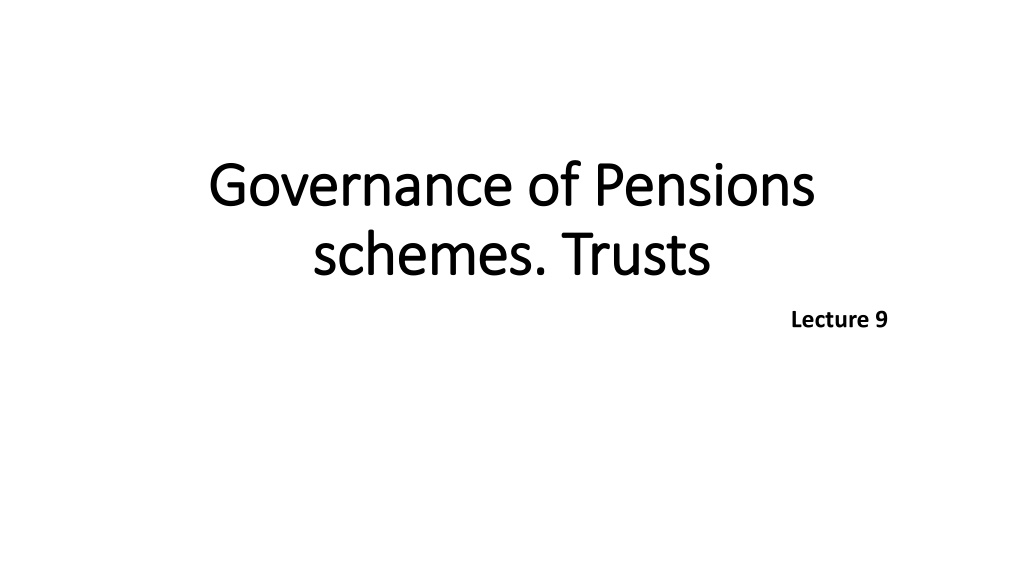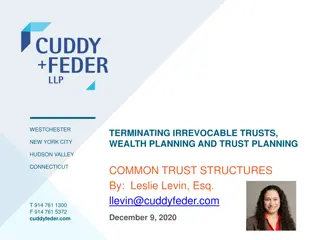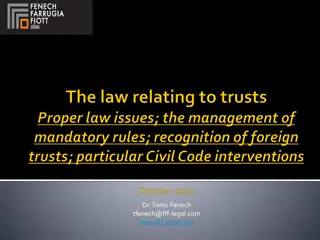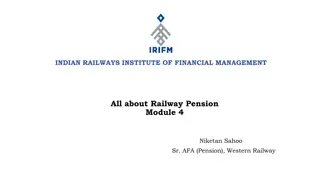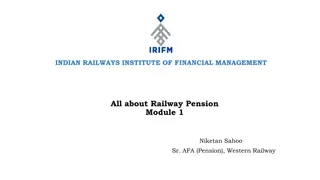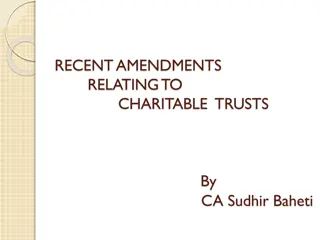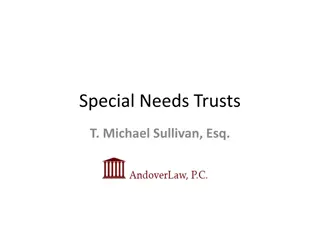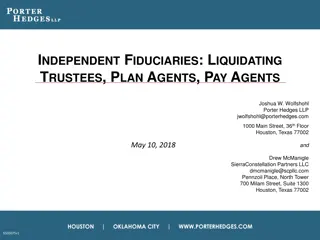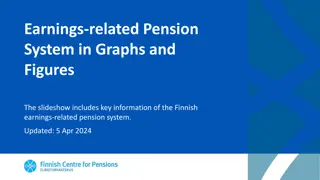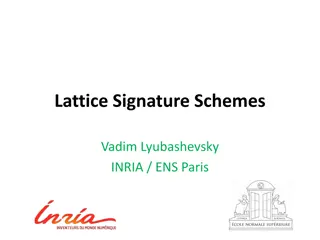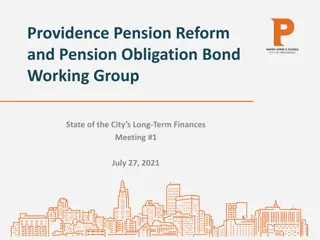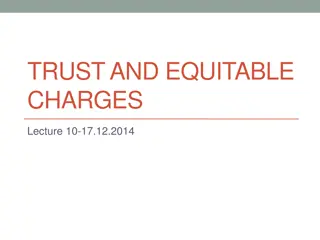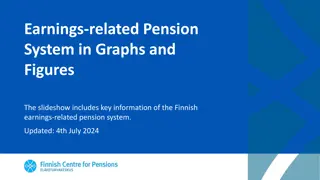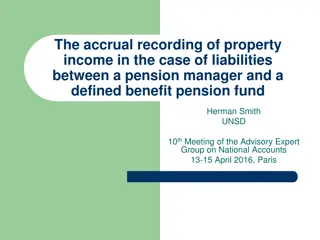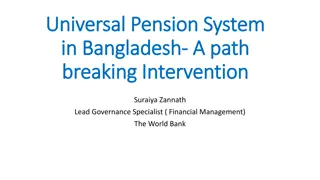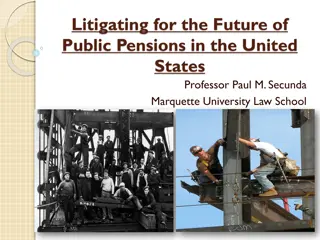Understanding the Governance of Pension Schemes and Trusts
Explore the concept of trusts within pension schemes, as legally defined entities separate from employers, where funds are held for beneficiaries. Delve into the history and key elements of trusteeship, highlighting the importance and legal aspects of trusts in managing pension funds.
Download Presentation

Please find below an Image/Link to download the presentation.
The content on the website is provided AS IS for your information and personal use only. It may not be sold, licensed, or shared on other websites without obtaining consent from the author. Download presentation by click this link. If you encounter any issues during the download, it is possible that the publisher has removed the file from their server.
E N D
Presentation Transcript
Governance of Pensions Governance of Pensions schemes. Trusts schemes. Trusts Lecture 9
Introduction Introduction What is a Trust? Section 3 of the Pension Scheme Regulations Act defines a trust as the legal entity, separate from the employer, in which the pension scheme funds are accumulated and includes a multi- employer trust or a single employer trust . Section 8 (2) states that Every pension scheme, other than a scheme established by a written law, shall be established under an irrevocable trust. A legal concept under which property is held by one or more persons (the trustees) for the benefit of other persons (the beneficiaries) for the purposes specified by the person setting up the trust. The trustees may be beneficiaries. Pensions Terminology A Glossary for Pension Schemes; Sixth Edition. London, 2002 Trust law In common law legal systems, a trust is an arrangement whereby property (including real, tangible and intangible) is managed by one person (or persons, or organizations) for the benefit of another.
Introduction Introduction The Lands (Perpetual Successions) Act Cap 186 provides for the registration of trusts as separate legal entities. Certificate of incorporation of the Trust Section 6 this states that the certificate of incorporation granted shall be conclusive evidence that all the preliminary requisitions contained in the Act are complied with Upon creation of a trust, a trustee gets a legal title to the trust property but the beneficiary retains an equitable title to the trust property.
Historical development Historical development The history of trust can be traced to the era of the Statutes of Mortmain of 1279 and 1290 respectively which sought to restrict perpetual holding of land by the church. Mortmain- The dead hand Trusts play a significant role in all common law systems, and their success has led some civil law jurisdictions to incorporate trusts into their civil codes. Trust Act 1893 which applies by virtue of The English Statutes Extent of Application Act CAP 11.
Historical development Historical development The 1893 Trust Act brought to the fore a number of key elements of trusteeship such as the following: Appointment of the trustees in accordance with the trust deed (section 10). Provision for the retirement of a trustee with the consent of other trustees or as provided by the Deed (Section 11). Removal of trustees and replacement by court process (Section 25).
Why a trust? Why a trust? Separate from the employer or sponsor and so assets can be held or kept separately A trust defines or gives the purpose of the pension scheme It accords the pension scheme its own legal standing
Who is a trustee? Who is a trustee? Paragraph 1 Fourth Schedule of the Income Tax Act CAP 323 gives the following definition means the persons, by whatever name called, having the management or control of a fund which either is or was an approved fund within the meaning of approved fund as defined in this Act, or which is a fund or scheme in relation to which an application is made under paragraph 2 for the approval of the Commissioner-General. An individual or a company which, alone or jointly, becomes the legal owner of property to be administered for the benefit of someone else (the beneficiaries), in accordance with provisions of the document creating the trust and the provisions of trust law generally and the Pensions Act. Certain schemes, mainly in the public sector, are not set up under trust. In these cases, the Pensions Act includes the administrators of the schemes in its definition of Trustees. Pensions Terminology A Glossary for Pension Schemes; Sixth Edition. London, 2002
Who is a trustee? Who is a trustee? A responsible person who looks after the interests of other persons who cannot look after their own interests because they lack capacity (e.g. children, aged, mentally ill, bankrupts) or are part of a collective (e.g. pensioners and beneficiaries under a will) Can be individual, collective or corporate One whose loyalty and interest is to the beneficiary (ies) fiduciary duty and can be held liable Exercises discretionary decision making powers.
Duties of a Trustee Duties of a Trustee Duties are extremely onerous and must be carried out with utmost diligence Some duties arise automatically from the relationship between trustee and beneficiary and other duties are imposed and regulated by statutes. See; Payne v Evens (1874) LR 18 Eq 356. Central to the trustee s functions is the fiduciary duty imposed by equity which requires an obligation of loyalty and faithfulness.
Duties of a Trustee Duties of a Trustee Except where duties arise under statute, duties are general trust law duties Trust law duties are fiduciary and must be exercised in the best interests of the scheme s beneficiaries. It is an established principle that the best interests of the beneficiaries of a scheme are usually the best financial interests of those beneficiaries. In Cowan V Scargill (1984) 2 ALL ER 750 Megarry V C stated: ..Under a trust for the provision of financial benefits, paramount duty of the trustees is to provide the greatest financial benefits for the present and future beneficiaries. E v E [1990] 2 F.L.R 233 the
Duties of a Trustee Duties of a Trustee A trustee is in breach of his/her duties if the take advantages of an opportunity that the corporation would otherwise be interested in. see; Regal Hastings v Gulliver [1967] 2 AC 134 Edge v Pension Ombudsman [2000] CH 602 Duty to provide accounts and Duty to provide information; see Tiger v Barclays Bank Ltd [1952] 1ALL ER 85 Pearse v Green (1819) I Jac.& W. 135 Re Tillott [1892] 1 Ch 86
Duties of a Trustee Duties of a Trustee In Lewis V Nobbs 8 Ch.D 391 (1878) the trust property included bearer bonds which were in the sole control of one trustee. When this trustee went off with the bonds in his custody, the other trustee was held liable because by his negligence he had facilitated the misappropriation. In order to protect themselves, trustees are now given the right by the Pension Scheme Regulation Act to appoint custodians of trust property and documents. In relation to bearer securities, the trustees must appoint a custodian. Section 17 B (3) of the Act provides for qualifications of custodian
Duties of a Trustee Duties of a Trustee The trustee may not make an unauthorized profit from his position as trustee. He must not put himself in a position where his duty to the trust and his own personal interest may conflict. For example, a trustee cannot buy assets from or sell assets to a pension scheme.
Duties of Trustees Duties of Trustees Subject to any contrary provision in the trust instrument, the purchase of trust property by a trustee is voidable by any beneficiary. See; Gillet v Peppercorne (1840) 3 Beav. 78 The trustee should not benefit from his office and reflects the possibility that the trustee might not give the best price obtainable. A transaction can be set aside as against the trustee as well as against any purchaser from the trustee who has notice of the breach of trust. The self- dealing rule applies even in the absence of unfairness or sharp practice and regardless of whether or not the trustee makes a profit. Bray v Ford [1896] AC 44 per Lord Hershell: it is an inflexible rule of equity that a person in a fiduciary position is not entitled to make a profit. He is not allowed to put himself in a position where his interest and duty conflict.
Duties of Trustees Duties of Trustees A beneficiary s ability to set aside the transaction applies even if the property was bought at a public auction: Exp. Lacey (1802) 6 Ves 625 If a trustee retires in order to purchase trust property, the sale remains voidable. This intention will be presumed where the sale follows closely after retirement. See; In Re Bales and British Land Co s Contract (1902) 1 Ch 244, a sale was not set aside where the trustee had retired 12 years before he purchased the property. If a trustee obtains an option to purchase, the Court is likely to set it aside as the trustee could exercise his option when prices are low.
Remuneration of Trustees Remuneration of Trustees A trustee must not use his position in order to obtain paid employment. In Williams V Barton (1927) 2 Ch 9 a Stockbroker trustee had to hand over to the trust the commission he earned on valuation by his firm of the trust assets. Often a trustee will obtain remuneration as a director of a Company. If the directorship was acquired because of his position as a trustee, he will be accountable to the trust. This is not so, if the trustees were directors before they become trustees Re Dover Coalfield Extension Ltd. [1908] 1 Ch 65 Or if the trustees were appointed directors without any reliance on the trust votes Re Gee [1948] Ch 284
Remuneration of trustees Remuneration of trustees The trustee cannot charge for his time and trouble.(General principle: no profit from position. Should a trustee benefit then is liable to account) This follows from rule that trustees cannot charge for his time and trouble and it is a gratuitous office.(Trustee must not benefit from trust property and should avoid conflict of interest and duty) Even a Solicitor (legal practitioner) trustee cannot charge for anything other than his our- of-pocket expenses. Exceptions to this rule. If all the beneficiaries are sui juris (of full legal capacity) and there is no possibility of undue influence, they can agree to the trustee being paid. If the trust documents expressly permit it. The court has an inherent jurisdiction to allow a trustee to be paid where there is no charging clause in the trust instrument. See; Re Worthington [1954] 1 ALL ER 677, Broughton v Broughton (1854) 5 De G.M & G 160
Remuneration of trustees Remuneration of trustees Solicitor trustees costs of litigation are the subject of special treatment.. According to the rule in Cradock v Piper (1850) 1 Mac & G 664; 41 ER 1422 a solicitor trustee is entitled to profit costs in litigation where he acts as solicitor for himself and for a co-trustee in relation to the trust( or as a trustee and on behalf of a beneficiary) A trustee that is a trust corporation is entitled to reasonable remuneration. A trustee who acts in a professional capacity is entitled to reasonable remuneration provided that the other trustees agree in writing. A trustee is entitled to be reimbursed for out of pocket expenses such as insurance premiums, fees paid to brokers and money spent on repairs. A trustee will also be allowed his litigation costs if the Court grants leave to sue or defend. If the trust contains a business as part of its assets then the trustee should not compete.
Standard of duty Standard of duty Each trustee has an obligation to act as a prudent person would, not only in the conduct of his own affairs, but also in looking after the affairs of third parties. At common law, the duty of care placed upon a trustee when investing trust funds is higher than that imposed on him when carrying out his other administrative functions. The trustee must invest the trust property wisely acting as an ordinary prudent man making investments: Whiteley v Learoyd (1886) 33 Ch. D 347 Section 24 AND 25 PSRA a trustee ought to conduct the business of the trust in the same manner that an ordinary prudent man of business would conduct his own, and that beyond that there is no liability or obligation on the trustee Per Sir George Jessel MR in Speight v Gaunt (1883) 22 Ch D 727
Duty of care Duty of care In Nestle v National Westminster Bank Plc [1994] 1 All ER 118; the modern portfolio theory was launched. This entails that, as trustees will often introduce an element of diversity to their investment portfolio, they are to be judged on their overall performance and not the failure or success of a particular investment. To any special knowledge or experience that he has or holds any special knowledge or experience that is reasonable to expect of a person acting in the course of that business or profession. A Professional trustee is expected to show a higher degree of care than a lay trustee. A trust company with specialist staff will be judged on a different level to an unpaid, family trustee Bartlett V Barclays Bank Trust Co. Ltd (1980) Ch 515.
Delegation Delegation Trustees must not generally delegate their powers or discretion unless they are authorized to do so by the trust deed and rules. There are some statutory powers of delegation most notably power to delegate investments to a manager, day to day administration of a fund to an administrator and the safe custody of scheme assets to a custodian. Section 17A of the Act It is generally appropriate for the trustees (provided there is power under the scheme s documentation) to appoint a person as administrator to administer the scheme on a day-to-day basis. The person so appointed should be fully informed of the duties and responsibilities which the trustees have delegated to him. There should be a written agreement between the trustees and the administrator.
Board of Trustees Board of Trustees The Pension Scheme Regulation (Amendment) Act, No. 27 of 2005 under Section 5 provides for appointment of Trustees of all pension schemes. 8.3(a)manner of appointment or election of Trustees and their term of office. 3(b) functions, powers and duties of Trustees. 3(c) composition of the Trustees (one half to be appointed or elected by members and other half by the sponsoring employer).
Board of Trustees Board of Trustees 3(d) methods of and grounds for, removal from office. 3(e) election or appointment of chairperson and his/her functions, powers and duties. 3(f) quorum i.e. 50% of total number 3(g) procedures of convening meetings
Qualifications of Trustees Qualifications of Trustees 8.4(a) has not been sentenced to imprisonment for fraud or dishonesty for period of 6 months or so. 4(b) not bankrupt 4(c) was not previously involved in the management or administration of a scheme which has been deregistered due to poor management or administration. 4(d) has not been disqualified under any law. 4(e) is considered detrimental to the scheme.
Governance Documents Governance Documents Trust Deed-A legal document, executed in the form of a Deed, which establishes, regulates or amends a trust. Pensions Terminology A Glossary for Pension Schemes; Sixth Edition. London, 2002 A trust deed sets out in detail the powers and duties of trustees. The following are some of the key points found in a deed: The objective or purpose of the trust The mode of appointment, removal and resignation of trustees The powers and duties of trustees The Scheme Rules form part of the governance documents
Pension Scheme Registration Procedure Pension Scheme Registration Procedure Registration authority is Pensions and Insurance Authority Completion of an application form Fee (minimum 5556 units per scheme) Signed Scheme Rules that complies with Pension Scheme Regulation Act and Income Tax Act Affiliation Agreement/deed of Adherence between the sponsor and the multi-employer trust fund if applying to join a multi employer scheme Trust Deed of the Scheme Certificate of Incorporation of the trust Approval by Commissioner General of the Zambia Revenue Authority as an approved fund Any other requirements as the Registrar may prescribe (there is a requirement to meet fit and proper criteria for Trustees)
